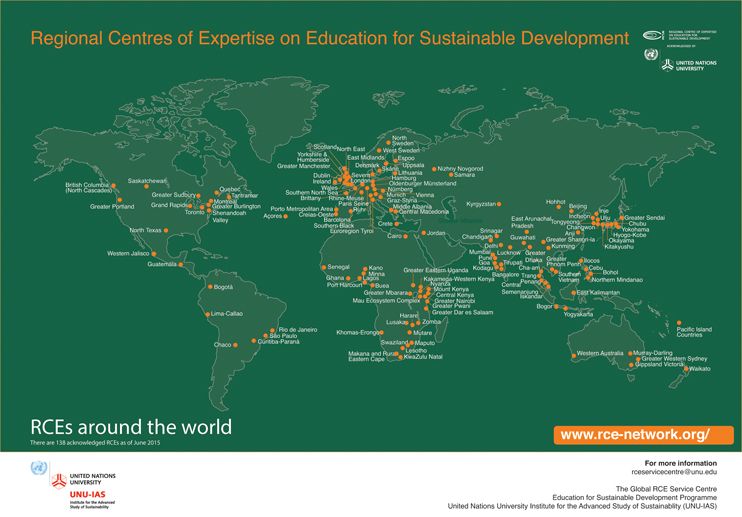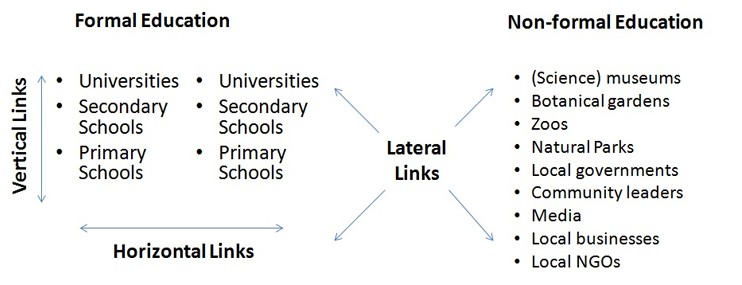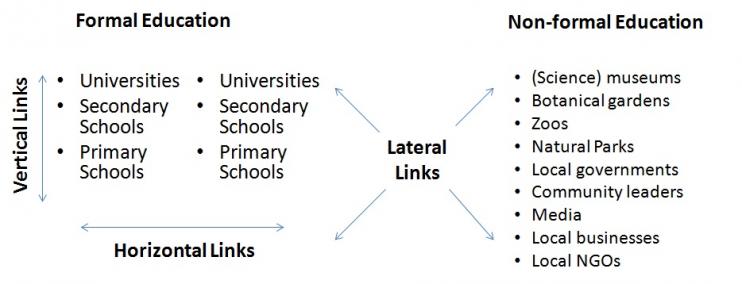UNU Blog: SDG 4: Change through Learning: Advancing Sustainable Development through Education
by Zinaida Fadeeva
“A collective sigh of relief was heard from the international education community when the sustainable development goals (SDGs) proposed by the Open Working Group (OWG) of the General Assembly in July 2014 included a stand-alone goal on education”, wrote the UN Chronicle reflecting on the struggle to bring education forward as a human right and a powerful enabler for inclusive and sustainable development. Education and learning encourage individuals and organizations to change themselves and the systems they are part of, even though such change often takes time. A separate SDG on education assures its importance, amidst competing development demands.

Sustainable Development Goal 4 commits governments to “Ensure inclusive and equitable quality education and promote lifelong learning opportunities for all”. The specific targets under this overarching goal and proposed means of implementation reflect the outcomes of decades-long developments in education communities. In economically developed and in developing countries, education has demonstrated its potential to generate better livelihoods, improve health and extend life expectancy, reduce gender disparities, minimize environmental risks and excessive consumption of natural resources. Education also provides a fertile ground for development of innovations in all spheres of life, for example solutions to reduce greenhouse gas emissions, to counter likely impacts of climate change, to benefit sustainably from biodiversity and many more.
The Education for All (EfA) movement and later the Decade of Education for Sustainable Development (DESD) provided opportunities for member states and stakeholders alike to design, test and scale up actions towards an overall transformation of educational systems. One might say that they also provided complementary strategies to address challenges related to sustainable development. EfA kept its primary focus on access to education for children, adolescents and other vulnerable and marginalized groups. Education for Sustainable Development (ESD), together with other notable educational initiatives, such as Environmental Education (EE) and more recently the Global Citizenship Education (GCE), placed emphases on the content and direction of education to empower all learners to address the social, economic and environmental issues they face. The proposed SDG4 addresses the issue of access to education as well as the expected outcomes from education.
It’s a question of quality
SDG 4 explicitly aims for an ‘inclusive and equitable quality’ of education at all levels and in all relevant domains accessible to all people, everywhere and at any time in their lives. The quality therefore applies broadly, to the quality of the learning outcomes, including both life skills as well as subject knowledge, and to the quality of the educational systems that can deliver the process in inclusive and equitable ways, addressing the learning needs and aspirations of diverse learners.

Over 10 years of experiences, collective knowledge and insights into the DESD can shed some light on questions of quality of education, including that of the education system. First, education is both a fundamental right and a public good. Second, education allows learners to recognize the risks of present unsustainable lifestyles and trends, and empowers them to come forward with appropriate solutions. This is also referred to as ‘instrumental rationality’. It goes hand in hand with the recognition that in order to facilitate sustainable development, educational systems have to ‘walk the talk’, and transform themselves. This entails the adoption of more sustainable use of resources in ‘educational operations’ as well as transformation in what is taught, how it is taught and what constitutes learning success. This calls for educational institutions and educators to engage with their communities and other stakeholders. Educators will need to implement new approaches in education that not only give learners understanding of subject areas but also empower them to solve sustainability challenges and thus to become agents of change towards sustainable development.
ESD is principally about developing learners’ competencies to deal with complex challenges and possible trade-offs. This also calls for the ability to forge partnerships, appreciate complementary perspectives, and formulate solutions. The present job market may not have matured enough to assess ‘soft’ or ‘competency-based’ qualities in recruitment processes, and thereby assumes that those who master their areas of study will also excel in developing solutions to complex situations. To achieve the SDGs, this must change.
These educational insights help us understand further that to achieve the post-2015 agenda, quality education must be inclusive and equitable as well as transformational.
Relating education to sustainable development and opportunities ahead
SDG 4 is ambitious in aiming to meet the demands and aspirations of all learners. Even though its formulation speaks principally to equitable access to quality education, one should keep in mind that the education SDG is contextualized by the other SDGs that jointly map out a “road to dignity by 2030”. The other 16 SDGs, covering both drivers to sustainable development (green economy, industrialization and innovation) as well as mitigation of current challenges (climate change, poverty and malnutrition, loss of biodiversity, etc.), determine what education needs to deliver.
To better link SDG 4 to sustainable development we must think about, for example, how to align learning outcomes and skills to sustainable development (Targets 4.1 and 4.4), how to link requirements for scholarships for developing and least developing countries to sustainable development and green economy (Target 4b) or how to refer to the need for sustainable development while increasing the training of qualified teachers for developing countries (Target 4c).
Often, in societies where basic services are not provided or where there is an indifference to environmental and social problems, learning communities mobilize stakeholders from below to awaken institutions to act. Education, in other words, becomes a leading force in challenging and eventually changing prevalent processes. Yet, this only happens if learning resonates with the realities of people, their histories, culture, social relations and the economic conditions in which they live. One example of this is the global movement of RCEs, or Regional Centres of Expertise on Education for Sustainable Development, established in 2005. RCEs operate as regional partnerships that bring together the formal and/or informal education sectors with government, businesses and the civil society, in order to develop ― through learning ― practical solutions towards local sustainability challenges. They empower individuals and organizations to implement them, individually and in partnerships. Their shared commitment to change and to the history of collective engagements through learning and research projects, as well as through contributions to the policy processes at the regional and global levels, is a powerful case for how locally integrated learning systems contribute towards sustainable development.
In today’s complex and fast moving world, education is no longer a one-directional process. Individuals and communities co-engage with each other and with outside knowledge holders in addressing pressing issues.
Education as the basis of Sustainable Development
So what do experiences from ESD tell us?
Education is the guide towards change. When looking for solutions to larger societal problems, one needs to reflect on the history of the issue at hand, through scientific and pragmatic approaches, but also by assessing the consequences of these solutions rather than blindly following recommendations made by (often reputable) authorities. Engaging people, sectors and communities in any kind of sustainability work would be more productive if done through learning (or enquiry)-led change: a process that does not rely solely on (outside) advice when trying to find a solution to a problem, but allows for conscious learning, knowledge acquisition and co-creation. As a result, education becomes a key element in advancing each of the 17 goals.
While SDG4 places education at the core of sustainable development, critical thinking about the role of knowledge production (and education) in today’s world is a key factor in achieving concrete changes towards a sustainable future.




